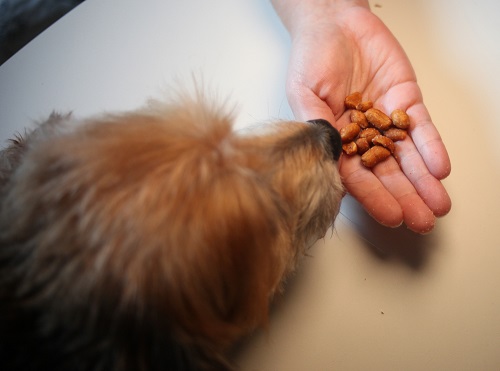Can Dogs Eat Peanuts? Or are peanuts bad for dogs? Let’s learn if you can serve your furry friend with those crunchy treats!
Can Dogs Eat Peanuts? When considering adding peanuts to your dog’s diet, it’s essential to be aware of the potential risks and benefits. Let’s explore these in more detail.
What are Peanuts?

Peanuts are a type of legume that grow underground. They are commonly used for making peanut butter, oil, roasted snacks, and in cooking. Peanuts are rich in protein, fiber, healthy fats, and various vitamins and minerals. They are also a good source of antioxidants and may offer some health benefits, such as reducing the risk of heart disease and promoting weight loss.
Check out Can Dogs Eat Chestnuts | Are Chestnuts Safe For Dogs? here
Can Dogs Eat Peanuts?
Yes, dogs can eat peanuts.
While peanuts are not toxic to dogs, they should be given in limited quantities due to their high-fat content. Excessive consumption of peanuts may lead to gastrointestinal issues or, in extreme cases, pancreatitis. Also, remember to feed dogs unsalted, unflavored, and shelled peanuts to avoid potential hazards associated with salt, additives, and choking on shells.
As with any new food, it is best to introduce peanuts slowly and monitor your dog for any adverse reactions.
Are Peanuts Bad for Dogs?
Peanuts, while not inherently toxic to dogs, can pose potential risks when consumed in large quantities or in certain forms. Although peanuts are a good source of protein and healthy fats, they are high in calories and fat, which may lead to obesity and related health issues if fed excessively.
Additionally, peanuts with added salt, sugar, or artificial sweeteners, such as xylitol, can be harmful to dogs, as these additives can cause digestive problems, increased thirst and urination, and even lead to more severe conditions like seizures or liver failure.
It is essential to practice moderation and consult a veterinarian before incorporating peanuts or peanut products into your dog’s diet.
Check out Can Dogs Eat Water Chestnuts | Are Water Chestnuts Safe for Dogs? here
Health Benefits of Peanuts for Dogs

Here are some of the potential health benefits of peanuts for dogs:
- Protein: Peanuts are a good source of protein, which is essential for building and repairing tissues in a dog’s body.
- Healthy Fats: Peanuts are rich in healthy fats, such as monounsaturated and polyunsaturated fats, which can help improve a dog’s coat and skin health.
- Vitamins and Minerals: Peanuts contain various vitamins and minerals, such as vitamin E, niacin, and magnesium, which are beneficial for a dog’s overall health and well-being.
- Antioxidants: Peanuts contain antioxidants that can help protect a dog’s cells from damage caused by free radicals.
- Weight Management: Peanuts can help dogs feel fuller for longer periods, which can aid in weight management.
Check out Can Dogs Eat Coconut | Are Coconuts Safe for Dogs? here
A Few Health Concerns of Peanuts
While peanuts can offer some health benefits to dogs, there are also some potential health concerns associated with feeding them to dogs. Here are a few health concerns to keep in mind:
- Aflatoxin Risk: Peanuts can sometimes be contaminated with aflatoxins, which are toxic compounds produced by fungi. Aflatoxins have been linked to liver damage and cancer in dogs
- Digestive Issues: Peanuts can be difficult for dogs to digest, and they may experience digestive problems such as vomiting, diarrhea, and pancreatitis.
- Allergies: Some dogs can be allergic to peanuts, which can cause severe reactions such as swelling, itching, and difficulty breathing.
- Choking Hazard: Peanuts with shells on can be a choking hazard, and dogs may also struggle to digest the shells.
- High-Fat Content: While peanuts are a good source of healthy fats, they are also high in calories and can lead to weight gain if given in excessive amounts.
What To Do If Your Dog Eats Excess Peanuts

Here are the steps to take if your dog eats excess peanuts:
- Monitor Your Dog: Keep an eye on your dog and look out for any signs of discomfort or distress. If you notice any concerning symptoms, contact your veterinarian immediately.
- Provide Water: Offer your dog plenty of water to help them stay hydrated and flush out any excess peanuts.
- Limit Food: Limit your dog’s food intake for the next 12 to 24 hours, but continue to provide water.
- Consult with Your Veterinarian: If your dog experiences severe symptoms such as difficulty breathing or signs of an allergic reaction, seek veterinary care immediately.
Check out Can Dogs Eat Almonds | Are Almonds Safe for Dogs? here
Other Nuts That Dogs Can Eat
If you’re looking for an alternative to peanuts for your dog, there are several other types of nuts that can be a safe and healthy option when given in moderation. Here are some of the nuts that can serve as alternatives to peanuts:
- Almonds
- Cashews
- Hazelnuts
- Pecans
- Pistachios
Note: Ensure that the nuts must be unsalted and free from any additives.
Quick Takeaways
So, Can Dogs Eat Peanuts? They can. It must be given in moderation and with caution. Peanuts offer some nutritional benefits, but they can also cause digestive problems and allergic reactions in some dogs.
Always consult a vet before introducing any new food to your dog’s diet.
